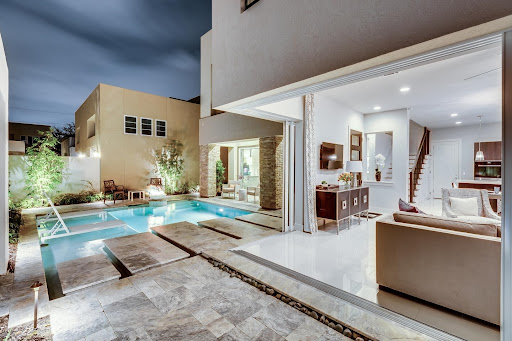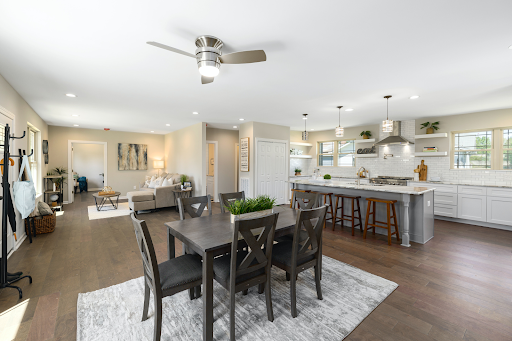Setting out to find or create your dream home involves navigating the crossroads of custom homes vs production homes. At McVaugh Custom Homes, our expertise as a custom home builder equips us to unravel the intricacies of this choice. In this comprehensive guide on custom homes vs production homes, we will walk you through the essential differences, benefits, and considerations to help you make an informed decision.
Production Homes vs Custom Homes: Core Definitions
In homebuilding, two predominant choices emerge: custom homes vs production homes. As these terms frequently surface in real estate discussions, unraveling their core definitions is pivotal to making the best housing decision.
What Are Production Homes?
Production homes are commonly found in master-planned communities and operate on predefined architectural designs. Potential homeowners are presented with a select array of design models. While some minor customizations might be available, the options are generally limited.
Due to the scale of mass production, these homes prioritize efficiency, often translating into using standard materials. While cost-effective, these materials bring about a level of uniformity in the homes across a given community.
What Are Custom Homes?
The allure of custom homes lies in their inherent ability to cater to the homeowner’s individual tastes. Whether the floor plan, room layout, or intricate details, each design decision is governed by the homeowner’s vision.
The distinction between custom homes and production homes is most evident in their uniqueness. A custom home is an embodiment of its owner’s character. From a kitchen tailored to a gourmet chef’s specifications to a living room that doubles as an art gallery, custom homes provide a canvas for homeowners to express their lifestyle and aesthetics.
When weighing the benefits of custom homes vs production homes, each stands strong with its unique offerings. While production homes offer quick, efficient, and often more economical solutions, custom homes provide an avenue for individual expression, allowing you to create spaces that resonate with your style and preferences.
Production and Custom Homes: The Process of Building
Grasping the intricacies of the building process is instrumental in discerning the critical differences between production and custom homes.
Planning and Design
The planning and design phase for production homes is streamlined and typically comes with a catalog of predefined designs. Potential homeowners select from a portfolio of predetermined models, each crafted to optimize efficiency and cost. While there is an element of choice available, significant modifications remain limited.
Custom Homes:
Unlike production homes, custom homes offer a broader design journey. The collaborative process thrives on collaboration, starting with a clear grasp of the homeowner’s aspirations and then shaping the blueprint accordingly.
Personal Consultations: Detailed discussions with architects and designers to transform ideas into feasible designs.
Flexibility in Design Choices: The homeowner has the creative freedom to adjust layouts, choose materials, and dictate the aesthetic theme.
Tailored Floor Plans: Unlike standardized designs, every room and space can be tailored to fit the homeowner’s lifestyle and preferences.
The difference in planning and design in custom homes vs production homes is the degree of personalization. While production homes offer swift decisions and rapid turnarounds, custom homes offer an unrivaled level of personalization, ensuring every nook and corner resonates with the homeowner’s identity.
Timeline and Construction
With their standardized blueprints, production homes usually have a faster construction trajectory. Their structured approach ensures efficiency from the onset to completion. However, the timeline can be influenced by factors such as development size or potential logistical setbacks.
Custom Homes :
Delving into the realm of custom homes, the timeline tends to stretch longer. This extension is attributed to the meticulous attention given at each construction phase. The primary stages include:
Site Preparation: Ensuring the lot is optimal for the envisioned design.
Detailed Construction Phases: From laying the foundation to installing the roof and interiors, every phase is executed with precision to match the homeowner’s detailed specifications.
Quality Checks: Rigorous quality assessments at each stage to ensure the final product is flawless.
When weighing production and custom homes in terms of construction timelines, it’s a trade-off between speed and personalization. While production homes offer the advantage of quicker possession, custom homes, with their elongated timelines, promise a residence that’s a true reflection of the homeowner’s essence.
Custom Homes vs Production Homes: Architectural Styles and Aesthetic Choices
The architectural fingerprint and aesthetic demeanor of a home are often mirrors reflecting the preferences and personalities of those who reside within its walls.
Production Homes Aesthetic
In the debate of custom homes vs production homes, it’s evident that production homes usually adopt tried-and-true architectural patterns. These styles are chosen for their broad appeal and are frequently observed in newer housing developments, particularly in suburban expanses.
Production homes prioritize consistency. Architecturally, this means houses within a neighborhood often bear striking resemblances to each other. This cohesive design strategy simplifies construction processes and often appeals to homeowners seeking a familiar residential aesthetic. However, this approach may sometimes sacrifice individuality for conformity.
Custom Homes Aesthetic
Stepping into the world of custom homes introduces a vast canvas of design possibilities. When comparing production homes vs custom homes, it’s not just about the process but also the potential. From sleek contemporary lofts to sprawling Mediterranean villas or cozy cottages, custom homes bring architectural dreams to fruition.
Beyond the general outlines of architectural design, custom homes delve deeply into the fine details of individual tastes. From exquisite foyer chandeliers to themed gardens and handpicked art spaces, custom homes capture the spirit of their owners. Each tile, shade of paint, and fixture emerges not from a standard catalog but from an expansive world of design options.
While both custom homes and production homes offer distinct advantages in terms of design, the former provides an unparalleled level of personalization, allowing homeowners to craft not just a living space but a tangible extension of their identity.
Advantages and Disadvantages of Production vs Custom Homes
Deciding between custom and production homes entails weighing the pros and cons that each option brings to the table. Here, we unravel the key advantages and disadvantages of both paths.
Benefits of Production Homes
Among the numerous advantages of production homes, their inherent predictability resonates most with homeowners. Their predefined designs and structures provide a clear view into the expected aesthetics and costs, giving homeowners the comfort of a known blueprint.
This structured approach also speeds up the construction process, allowing for a faster move-in, which is a boon for those anxious to settle into their new home. Furthermore, the economies of scale in production homes mean developers source materials in bulk, leading to potential cost efficiencies and a budget-friendly choice for many.
Downsides of Production Homes
The primary downside many homeowners face is the limited customization. Given the standardized nature of these homes, there’s a cap on how much personalization you can introduce. This might pose a challenge for individuals seeking to infuse their space with a unique personality.
The uniform design seen in numerous production home neighborhoods can sometimes be its Achilles’ heel. While indicative of quality, this consistency might produce a “cookie-cutter” aesthetic, which doesn’t appeal to every homeowner.
Benefits of Custom Homes
Often hailed for their unparalleled personalization opportunities, custom homes offer tailored designs, enabling homeowners to influence every detail, from expansive floor plans to door knob preferences. When discussing custom homes vs production homes, this adaptability and personalization stand out prominently.
Additionally, custom homes serve as an authentic reflection of the homeowner. More than just brick-and-mortar structures, they encapsulate the individual’s journey, aspirations, and stylistic preferences, providing a genuine sense of belonging.
With custom homes, homeowners relish the freedom of choice of premium materials. Unlike being tethered to standard options, they can handpick finishes, embrace advanced technologies, and select high-quality materials that resonate with their discerning tastes.
Downsides of Custom Homes
Despite their allure, custom homes come with certain challenges. The most notable is the extended timelines associated with their construction. Committing to precision, attention to detail, and the quest for perfection can mean a longer journey from blueprint to reality.
Additionally, the budget considerations are often more pronounced with custom homes. The emphasis on unique designs, high-grade materials, and individualized attention can mean a more substantial financial commitment.
While both custom and production homes serve the fundamental purpose of providing shelter, custom homes stand as a testament to individuality, craftsmanship, and an unparalleled commitment to quality. Custom homes are the clear choice for those who see their home as an extension of their persona and a space that should grow and evolve with them. After all, a home is a long-term commitment, and having it echo your distinct style and preferences ensures it remains a cherished space for years.
Production vs Custom: Which is Right for You?
When selecting the backdrop for life’s most treasured moments, the custom homes vs production homes debate becomes increasingly significant. Both avenues offer distinct features, catering to various homeowner preferences and budget considerations. With their streamlined processes and cost efficiencies, production homes appeal to those seeking predictable designs and faster move-ins.
Custom homes stand unparalleled for those who value a residence that tells a story uniquely their own. With McVaugh Custom Homes, crafting a custom home becomes a collaborative venture, translating visions into brick and mortar. As you ponder the next steps in your home-building journey and weigh the nuances of custom homes vs production homes, reach out to McVaugh Custom Homes, where personalized design meets impeccable construction.


